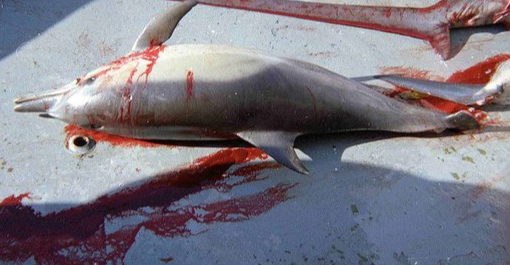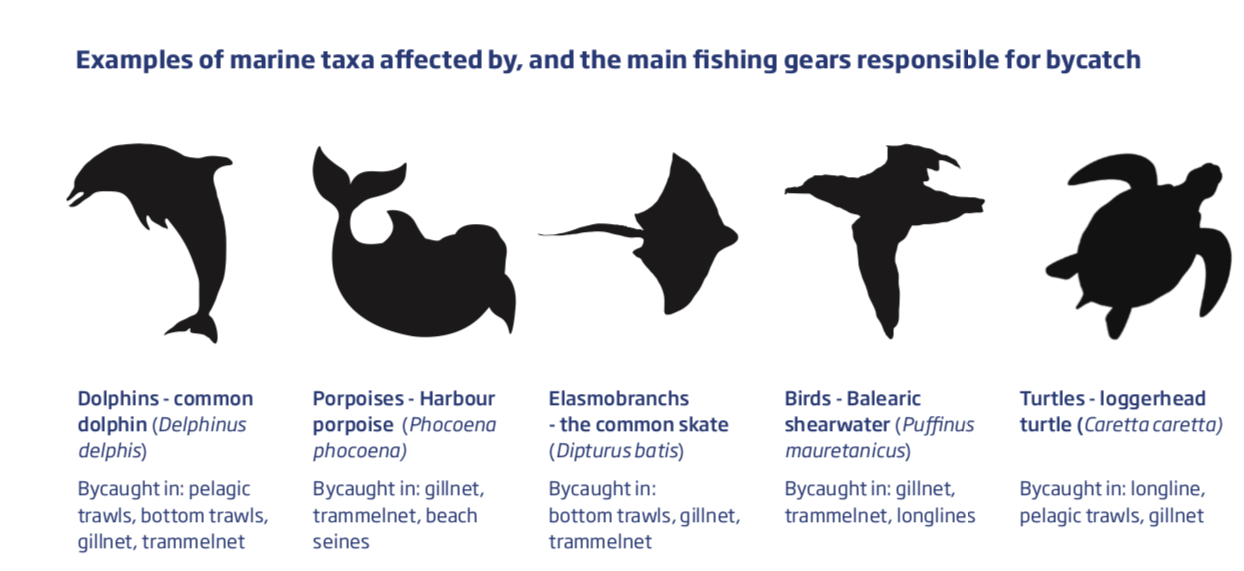Emergency Measures to be Brought in to EU Fisheries to Address Bycatch of Small Cetaceans.
Emergency measures to prevent by-catch of dolphins and porpoise have been advised to the EU Commission following an alarming increase in the number of by-caught common dolphins that washed ashore along France's Atlantic Coast from December 2019 to March 2019. In addition, concern has been raised about the population status of harbour porpoise in the Baltic Sea.
New emergency measures are to be introduced after scientists from the International Council for the Exploration of the Sea (ICES) published landmark advice on May 26th
2020 in order to reduce bycatch of small cetaceans.
An aim of the EU Common Fisheries Policy is to ensure the negative impact of fishing activities on marine ecosystems is at a minimum, which includes the non-intentional take of non-target species, known as by-catch. This has been a major issue since the 1970's, yet is a problem that remains unresolved. By-catch issues have long been ignored and under-documented, mostly because the occurrence of it is hard to monitor as it takes place far from ports and fish markets, so the phrase "out of sight out of mind" held true for far too long. Many types of fishing vessels, including pelagic or bottom trawls, bottom-set gillnets and longlines, contribute to this worldwide threat to marine megafauna such as cetaceans, marine turtles, sharks and also seabirds.
Under environmental directives such as the Habitats Directive and the Marine Strategy Framework Directive (MSDF), the by-catch of cetaceans is to be monitored and reduced. Although by-catch of small cetaceans happens on an annual basis all over the world, in recent years there has been a sharp increase in areas such as the Bay of Biscay and the Celtic Sea.
In the northeast Atlantic, the short-beaked common dolphin ( Delphinus delphis
) are one of the most abundant small cetaceans, and so are also one of the most vulnerable to by-catch in fisheries. By-catch of common dolphin is mostly reported in pelagic fisheries that target sea-bass ( Dicentrarchus labrax
) or albacore tuna ( Thunnus alalunga
) in the Bay of Biscay and the English Channel, however have also been reported in fisheries using gill-nets and trammel nets. For the year 2016, the estimated by-catch levels of short-beaked common dolphins in the Bay of Biscay ranged from 1607 to 4355 animals based on the observer programme, and from 1400 to 4800 based on stranding data (ICES, 2018; Peltier et al.
, 2020), in comparison with an estimated 2,000 from 1990 - 2009 based on observer programmes (Murphy et al
., 2013).
During the winters of 2018 and 2019 -
11,300 common dolphins died
as a result of fishing activities.
" The levels of bycatch we are facing are not acceptable. It can result in the extinction of local populations of protected species
." - said Virginijus Sinkevicius
- the European Commissioner for Environment, Oceans and Fisheries.
In the Baltic Sea, harbour porpoise ( Phocoena phocoena
) is listed as Critically Endangered by the IUCN and ASCOBAMS considers that "the subpopulation of harbour porpoise is of particular concern" as only a few hundred animals remain. Threat levels for the Baltic Proper harbour porpoise are considered high and include; by-catch, contaminants and underwater noise pollution.
Emergency measures to protect common dolphins in the Bay of Biscay and harbour porpoise in the the Baltic Sea to be implemented by the ICES based on the advice of several NGO's include;
Bay of Biscay
- Temporal closures of areas of concern in the northeast Atlantic between December and March and between July and August, and the application of pingers on pair trawlers to mitigate by-catch outside the period of closure.
(Pingers are devices that release short- high pitched signals at brief intervals to alert the animals to the presence of fishing gear).
- Dedicated marine mammal by-catch monitoring by observers or eMonitoring be undertaken on all fleets that may be involved with common dolphin by-catch in the Bay of Biscay, year round. Fishing vessels should only be allowed to fish in the region if they allow independent observers to be on-board.
Baltic Sea
- Spatial closures of Midsea Bank for all fisheries as it has the highest detection rates for harbour porpoise year-round, with peaks during the breeding season.
- Closure of gillnet fisheries in the rest of the Natura 2000 areas, until site specific assessments have been carried out for the impact of Acoustic Deterrent Devices (ADDs).
- Mandatory use of ADDs outside of Natura 2000 areas.
- Accurate recording of fishing effort and gear type used.
- Dedicated electronic monitoring of all gillnet vessels in the region.
- Monitoring and adaptive management/mitigation of gillnet fisheries.
Along with the advice, they also published a "Roadmap for ICES bycatch advice on protected, endangered, and threatened species," with the goal of assessing the risk and impact of fleet activity for incidental bycatch to be included in their 'Fisheries Overviews' by 2022.
© Ocean Research & Conservation Ireland (O.R.C.Ireland) and www.orcireland.ie , est. 2017. If you like our blogs on the latest news in marine science and would like to support our work, visit www.orcireland.ie to become a member, to volunteer or to make a donation today. This article has been composed based on credible sources.
References
:
ICES Special Request Advice Northeast Atlantic ecoregions Published 26 May 2020.
Peltier, H., Authier, M., Florence, C., Dabin, W., Dars, C., Demaret, F., Meheust, E., Ridoux, V., Van Canneyt, O., Spitz, J., (2019). Etat des connaissances sur les captures accidentelles de dauphins communs dans le golfe de Gascogne –Synthèse 2019.
Hélène, P., Willy, D., Cécile, D., Fabien, D., Ghislain, D., Olivier, V. C., … Vincent, R. (2019). Can modelling the drift of bycaught dolphin stranded carcasses help identify involved fisheries? An exploratory study. Global Ecology and Conservation.
Roadmap for ICES bycatch advice on protected, endangered, and threatened species.
SHARE THIS ARTICLE















